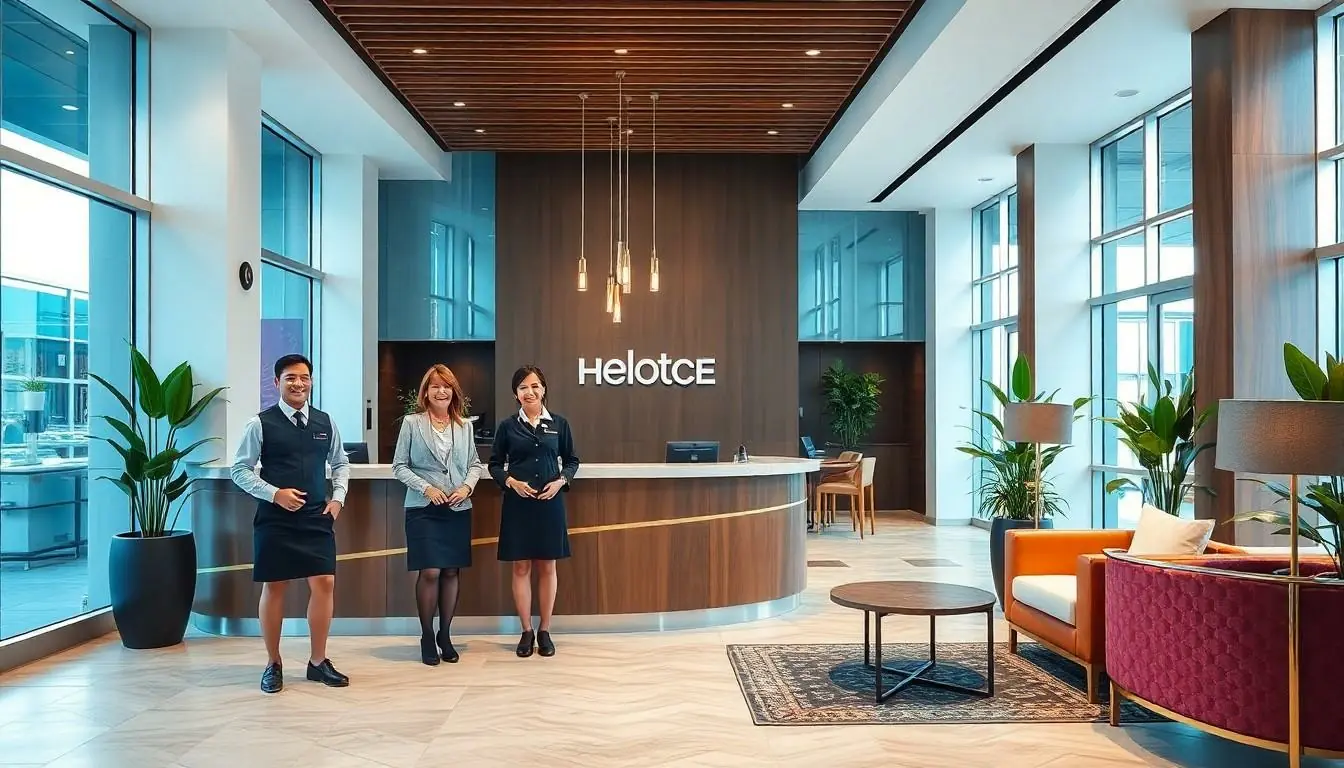In a world where “book now” buttons are as common as hotel lobbies, standing out in hospitality digital marketing is no small feat. Hotels and restaurants are no longer just competing for guests; they’re vying for attention in a digital jungle filled with flashy ads and viral TikTok dances. But fear not! With the right strategies, your establishment can shine brighter than a neon vacancy sign.
Table of Contents
ToggleUnderstanding Hospitality Digital Marketing
Hospitality digital marketing encompasses online strategies that hotels and restaurants use to attract guests. This approach leverages digital channels to enhance visibility and engagement.
Definition and Importance
Hospitality digital marketing refers to promoting hospitality services through digital platforms. It’s crucial because most travelers research online before making bookings. Establishments that invest in digital marketing tend to reach broader audiences and create personalized experiences. Capturing attention in a crowded marketplace fosters customer loyalty. Moreover, effective digital strategies enhance brand recognition, which can lead to increased revenue.
Key Components
Several components form the foundation of successful hospitality digital marketing. First, optimizing a website for search engines improves visibility. Second, engaging social media campaigns connect with customers and showcase offerings. Third, email marketing allows personalized communication with past guests and prospects. Additionally, utilizing online reviews and reputation management builds credibility. Lastly, data analytics helps measure performance and refine strategies, ensuring continuous improvement.
Strategies for Effective Hospitality Digital Marketing
Effective strategies empower hotels and restaurants to stand out in a competitive digital landscape. Implementing these methods maximizes visibility and engagement with potential guests.
Search Engine Optimization (SEO)
SEO enhances online visibility for hospitality establishments. By optimizing websites for relevant keywords, they attract traffic from search engines. Utilizing local SEO strategies ensures higher rankings in local search results, making it easier for travelers to find nearby options. Establishing quality backlinks from reputable sites boosts credibility and authority. Regularly updating content, including blogs and landing pages, keeps information fresh and relevant. Incorporating user-friendly navigation improves the overall experience, increasing the likelihood of bookings.
Social Media Marketing
Social media marketing engages audiences where they spend time online. Platforms like Instagram and Facebook showcase appealing visuals of hospitality offerings. Posting high-quality images and videos draws attention and invites interaction. Engaging with followers through comments and messages fosters a sense of community and loyalty. Running targeted ads on social media platforms allows establishments to reach specific demographics effectively. Incorporating user-generated content, such as guest photos, enhances authenticity and credibility. Regularly analyzing performance metrics enables continuous optimization of campaigns.
Tools and Technologies in Hospitality Digital Marketing
Various tools and technologies enhance the effectiveness of hospitality digital marketing. They streamline processes and enable targeted strategies to foster customer engagement.
Content Management Systems
Content management systems (CMS) facilitate the creation, management, and optimization of digital content. Popular options like WordPress and Joomla allow hospitality businesses to easily publish articles, manage their website, and update promotions without extensive technical knowledge. A user-friendly CMS can improve website performance and ensure content remains fresh and relevant. Additionally, integrating these systems with booking engines provides seamless user experiences, increasing conversion rates through straightforward navigation.
Analytics Tools
Analytics tools enable hospitality establishments to measure the effectiveness of their digital marketing efforts. Platforms like Google Analytics and Adobe Analytics track visitor behavior and provide insights on engagement metrics. These tools help in identifying patterns and understanding audience preferences. By analyzing data from various campaigns, businesses gain knowledge about which strategies produce the best results. Making data-driven decisions enhances marketing precision, leading to improved ROI and a more tailored experience for guests.
Trends Shaping the Future of Hospitality Digital Marketing
Emerging trends in hospitality digital marketing continuously evolve to meet changing consumer preferences. These trends focus on enhancing guest engagement and maximizing marketing effectiveness.
Personalization and Customer Experience
Personalization drives engagement in hospitality digital marketing. Establishments leverage data to create tailored experiences based on individual preferences. Customized offers increase conversions, as guests respond favorably to recommendations reflecting their interests. Implementing strategies such as targeted email marketing fosters loyalty and encourages repeat visits. Additionally, adopting AI technologies helps anticipate guest needs, providing a seamless experience from booking to checkout. Engaging with customers through personalized communication enhances brand connection, ultimately leading to improved satisfaction.
Mobile Marketing Initiatives
Mobile marketing initiatives have gained prominence in hospitality. Establishments optimize websites for mobile devices to enhance user experience. Surveys indicate that over 50% of travelers research and book accommodations using smartphones. Utilizing SMS campaigns engages guests effectively, delivering timely updates and promotional offers directly to their devices. Integrating location-based services allows establishments to target nearby users with relevant ads, driving foot traffic. Mobile apps also streamline guest interactions, enabling features like mobile check-in and room service requests. Innovating through mobile marketing aligns with consumer habits, ensuring competitive positioning in the digital landscape.
Conclusion
Hospitality digital marketing is crucial for establishments aiming to thrive in a competitive landscape. By leveraging effective strategies like SEO and engaging social media campaigns, hotels and restaurants can significantly enhance their visibility and attract more guests.
Investing in personalized experiences and utilizing data analytics not only fosters customer loyalty but also drives revenue growth. As trends continue to evolve, embracing new technologies and mobile marketing initiatives will be essential for staying ahead.
With the right approach, hospitality businesses can create meaningful connections with their audiences and ensure long-term success in the digital realm.




